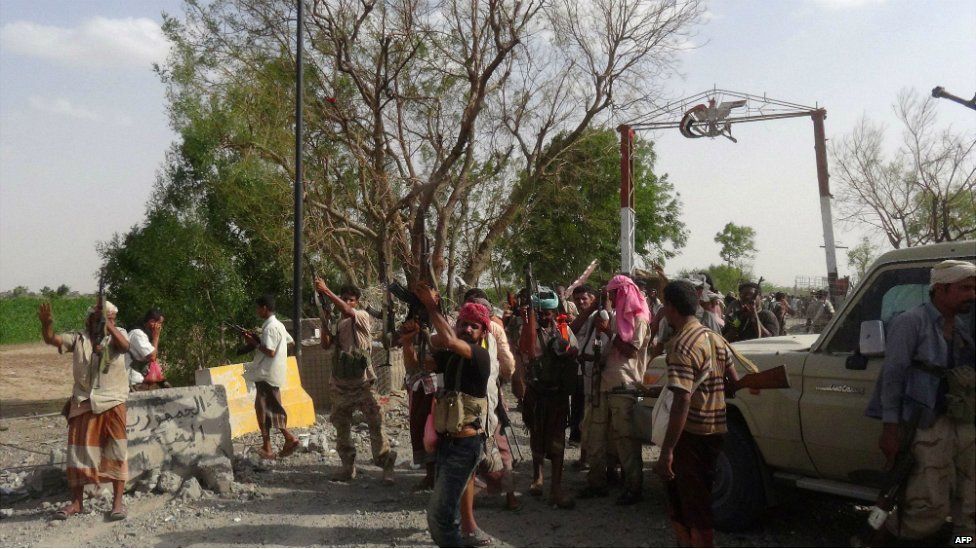Yemen crisis: Houthi rebels 'driven from key al-Anad airbase'
- Published

Pro-government forces in Yemen have retaken the country's largest airbase in a battle with Houthi rebels, government officials say.
Heavy casualties have been reported at al-Anad airbase, north of Aden, after intense fighting there in recent days.
It comes after pro-government forces, backed by air strikes from a Saudi-led coalition, retook Aden two weeks ago.
The Saudis are leading a campaign to defeat the rebels, who control much of Yemen, and restore the government.
Troops and armoured vehicles from the United Arab Emirates - a key member of the coalition - are also said to have arrived in Aden in recent days.
Military officials quoted by the AP news agency say the foreign troops are helping the pro-government forces operate sophisticated weapons, including tanks. The New York Times said the troops had been involved in the fighting at al-Anad.
However, local journalists told the BBC that Emirati troops had recently disembarked in Aden and were deployed as advisers, rather than in combat, while a Yemeni military official denied foreign troops had landed in Yemen.
Pro-government forces have recaptured Al-Anad airbase, north of Aden
Analysis: Jonathan Marcus, BBC diplomatic correspondent
The reported deployment of tanks and other armoured vehicles from the United Arab Emirates, which have been seen unloading in Aden over recent days, represents the first major ground involvement by the Arab coalition ranged against the Houthi rebels.
It is a signal that the air campaign launched in March has its limits and it is a sign too that the Saudi-led coalition is willing now to become more engaged in the fighting. The reinforcements may already have had a hand in the recapture of al-Anad airbase: an important asset that could provide a launch-pad for more extensive operations against the rebels.
It is a significant but also risky step. Heavy armoured forces may not be best suited to this kind of struggle and there is always a danger they could become bogged down when facing more nimble opponents. The Arab coalition's military gamble also risks exacerbating regional tensions - Iran has given some support to the Houthi rebels. But it represents a demonstration that, in the wake of the US nuclear deal with Iran, Washington's Gulf allies are determined to do whatever they believe is necessary to ensure their security.
Al-Anad used to be a base for US troops overseeing drone attacks on al-Qaeda. It was overrun by Houthi rebels as they advanced south in March, forcing President Abdrabbo Mansour Hadi to flee.
"The al-Anad airbase is now back in the hands of President Hadi's men," Nasr Alkaid, a spokesman for the pro-government forces, told the BBC. He said the loyalists were still battling rebels about 4km (2.5 miles) from the base.
Bashraheel Bashraheel, the editor of Yemen's Al Ayyam newspaper, told the BBC that the rebels were overstretched and outgunned.
"The Houthis aren't in an environment that supports them so their defeat was a matter of time," he said. "Their lines of supply have been cut off... and that's why we are seeing this quick collapse."
Why is there fighting in Yemen?
- Northern Shia Muslim rebels known as Houthis, backed by forces loyal to Yemen's ex-president, took over parts of Yemen, including Sanaa, and forced the government into exile in March
- The rebels accused the government of corruption and of planning to marginalise their heartland within a proposed federal system
- Forces loyal to the government, and southern militia, are fighting back, aided by air strikes led by neighbouring Saudi Arabia
There has been no comment from the Houthis on the claims that the base has fallen.
Its recapture could remove a major obstacle for government forces on the road to Taiz, Yemen's third-largest city, where pro-Hadi militia have been clashing with rebels. The rebels remain in control of the capital, Sanaa, and areas to the north.
Sunni power Saudi Arabia regards the Houthis as proxies of Shia rival Iran. It alleges Iran has provided the Houthis with weapons, something Iran and the Houthis deny.
The rebels - backed by forces loyal to the former President, Ali Abdullah Saleh - say they are fighting against corruption and marginalisation of their northern powerbase by Mr Hadi's government.
The conflict has killed almost 4,000 people, nearly half of them civilians, since it escalated with the Saudi-led campaign in March, according to the United Nations.
In other developments:
- The government of Djibouti has appealed for international help to cope with an influx of refugees from Yemen. The UN's refugee agency estimates that the tiny Horn of Africa nation is hosting some 10,000 Yemenis fleeing the conflict
- The UN envoy to Yemen, Ismail Ould Cheikh Ahmed, says there is growing support for his plans to end the conflict, Reuters news agency quotes a UN spokesman as saying. Past UN efforts at brokering peace in Yemen have failed